Zéro de conduite
(1934, Jean Vigo; Criterion spine #578, from The Complete Jean Vigo)
Vigo is so original, so startling, so compelling that he’s rarely been bettered. This no-budget film, shaky and smoky and as often out-of-focus as in-, with inexplicable cuts and dummies — actual, obvious dummies! — standing in for extras he could not afford or be bothered to secure, is still the ultimate expression of the nihilistic anarchy of childhood, the heartlessness and anger inherent in a child’s situation: completely powerless against adults and against society in general. Everyone who made a film about kids since him can only imitate Vigo. And make no mistake — this is hard stuff to imitate, because in Zéro de conduite Vigo throws out all pretense at realism at every turn. A schoolteacher’s cartoon doodle animates on the page as his colleague stares at it, turning from a rude caricature into an appropriately “academic” textbook illustration. Kids show off their crudest jokes and tricks to one another — balloons under the shirt to imitate what can here be only appropriately referred to as “boobies,” pillow fights and food fights, nose flutes and cigars and sleight-of hand — but they can just as easily perform Georges Méliès-level camera magic for each other, like the class clown who makes a soccer ball disappear for his fellows via a camera cut. The boys are often out of control, pure id, in classroom scenes where each one is moving independently or in the celebrated dorm scene where feathers from the pillows fill the air; this is difficult to rectify with any kind of reality. But the adults are equally over-the-top, from the weird teacher who lurks around the classroom when the kids are out, pawing through their belongings and stealing bites of their lunches, to the much weirder teacher who sniffs a tube of airplane glue right in front of the students.
For a film usually described as episodic there’s actually a very coherent story: Boys return via train to their boarding school, which is staffed by an array of horrible authority figures plus one humanistic teacher who is clearly just one of them, older without having crossed over into adulthood. Cassat and Bruel bond first and are clearly the troublemaker-ringleader types; they find and bring into their circle two boys who need looking out for (Colin, the slight and sad son of the school cook; and the effeminate “sissy” Tabard). Bruel and Tabard have an obvious crush on each other; the school authorities pick up on this and choose to torment Tabard as the weakest. But emboldened by their friends, both Colin and Tabard get their moment to stand up to authority. By the end, the all-important “Commendation Day” celebration (to which important military and clergymen have been invited) is destroyed by the four boys, pelting the crowd with garbage from above, waving a skull-and-crossbones flag, and running off over the rooftops. The planning for this act of anarchy has been seen throughout the film in schoolyard meetings; the boys very deliberately incapacitate and tie up their room monitor before marching off in parade formation. But narrative only goes so far; the fact that there’s no logical tie between this scene and the school celebration the next day (at which the other boys are shown serving the guests, and the conspirators are on the roof) tips the film back into pure fantasy.
There are so many elements here that must have been much harder to shoot than they seem. The child actors, especially en masse, rarely seem to be consciously acting; they look as hard to control in real life as they are scripted to be in the classroom. The dorm room has a ceiling — we are very deliberately shown the ceiling in the first shots of it. So when the camera is roving above the boys, like a god looking down on them and the dorm master in their beds . . . it’s technically thrilling. There are also many long master shots that contain loads of characterizing action; there couldn’t have been funds to do many takes of these.
Vigo was an avowed anarchist. There are obvious anarchist themes built into the film and its form, not just in the story: cuts directly in the frame, the mentioned use of dummies and camera tricks, lack of narrative logic. The film was never publicly exhibited during Vigo’s short life. Instead it was immediately banned outright due to nudity, homosexual content, disrespect of the army, disrespect of the church, and all-around disrespect of (adult!) authority. Vigo got to make one more film, his only full-length, from someone else’s script, the equally astonishing L’Atalante, during which he died at age 29. He wasn’t really discovered for another decade or two, until after the war. His influence since then has been staggering.
Reminds me of:
There are obvious connections here to other films about youth, most clearly in The 400 Blows which lifts the entire sequence of the boys running off during a school excursion, including the camera angles. In my memory, though, the Truffaut version is scored with twee music and suffused with starry-eyed nostalgia; I so much prefer this original version. (I could be 100% wrong about this; the next time I watch 400 Blows (and write a #WTW about it, obviously) I’ll come back here with a footnote if I’m being unfair.) Jean Dasté as the young-in-spirit teacher is so terribly irresponsible here that the whole boys-running-off narrative is raised to a higher level. Dasté doesn’t just lose the kids; he first leads them in pursuit of a woman and later stops off for a drink before they find and rejoin him completely on their own initiative. (Years ago when I first saw Zéro I hadn’t seen L’Atalante; Dasté’s huge and immediate appeal here easily carries over to his young barge captain there.)
Again, obviously, any of the great school rebellion stories connects here, most notably Lindsay Anderson’s If… and Malcolm McDowell’s indelible performance as Mick, winding up on the roof of the boarding school he attends — in his case, with a machine gun, openly murdering the adult authorities. Maybe I’m wrong that there are a host of such movies; maybe I just attribute the “boarding school” narrative (along with sadistic teachers and homosexual encounters) to British books and films in an unfair and clichéd way. But what about the Jack Nicholson-directed Drive, He Said from 1971? That ends with a school rout, too, in that case a release of animals from an experimental laboratory. Or is there a connection to Heathers and its apocalyptic ending, with the high school utterly destroyed?
And does anyone doubt that Wes Anderson took his signature slow-motion scenes (generally one per movie) from Zéro? Or from, simultaneously, this and Scorsese, who in turn took his signature slow-motion scenes from Zéro? Interestingly for such an early masterpiece, their filmic connection to the past is an echo of Vigo himself, who has Dasté demonstrate his light-heartedness by having him imitate Charlie Chaplin. Movies need other movies for reference, right from the very beginning.
So here’s my only thought that might not be obvious: Animal House. Apart from the fantastic casting, one of the aspects of John Landis’s 1978 film that came in for repeated positive comment at the time is the unconventional ending: the heroes of the film can’t succeed at school (in classes, as a fraternity, or socially), so instead they destroy their enemies by sabotaging the town-wide parade. It’s not a huge leap to imagine the Deltas as the next progressive step from the boys in Zéro, unable to win on society’s terms, they anarchistically destroy it. Animal House has to make its antagonists slightly more realistic — no professor sniffs glue in class (though Donald Sutherland’s seductive prof certainly does the equivalent off hours!) — but by the parade set piece at the end, the movie has similarly fantastical elements (Kevin Bacon crushed flat like a cartoon; band instruments crumpling like tin foil against a brick wall). I know a hundred critics cited Warner Brothers animation as a precursor for Animal House, or the once-removed work of directors like former animator Frank Tashlin, but the actions of the protagonists seem more akin to Vigo. Of course at the end of Zéro Vigo can’t give us any real sense of a future hope for the boys — they are so young, after all, and completely out of control of their fate. The slightly older men in Animal House have made it to college and then blown up their futures — but here, on the cusp of their adulthoods, Landis can end the film with a glimpse of each of their destinies. The put-upon anarchists wind up inheriting the earth, of course, with their future adult selves becoming senators and successes, while their tormentors are appropriately punished for their assholery. It’s hard not to imagine that Vigo would have been delighted with Landis’s film.
But then — the guilt!
I knew as soon as I’d finished watching L’Atalante that I wanted Vigo to be the first repeat director in my #WTW experiment — then I wound up watching Winterbottom’s two The Trip films first. I think I fairly nullified that by bundling them up as one piece, though. (Winterbottom might still win out as the second repeat director to be watched — I’ve had a hankering to rewatch 24 Hour Party People for a while now.)
Pitch:
I can’t get over the bizarre vignette in Cassat’s house, during the school break section (when we also see Colin’s home life). He’s clearly hanging out with a girlfriend, in his sitting room, with at least one adult present (behind the newspaper). But what exactly are they doing? We cut into the middle of some kind of game they’re playing, with her hanging a lantern on a wire. After blindfolding him. And flashing her underwear at us, the audience. The scene is suffused with details that would make Freud quietly lay down his pipe and slink out of the room. We already have a sense of Cassat as a confident and appealing personality; this very short scene adds immeasurably to his characterization. Even as I marvel at how well I feel I know Cassat and the other boys, I have no idea how Vigo possibly could have come up with a scene like this. It’s magic.





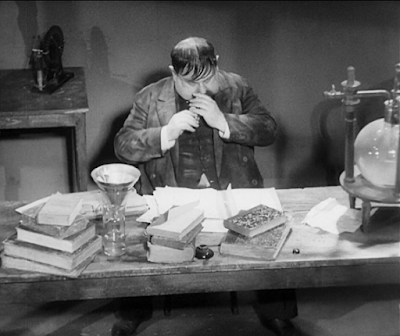
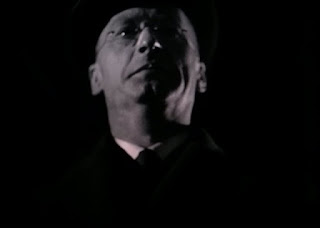


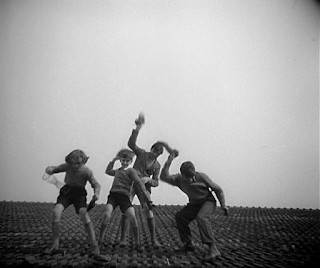
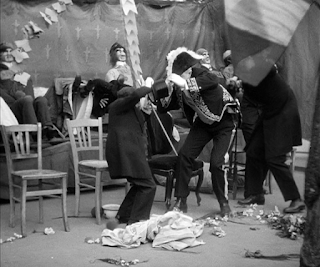
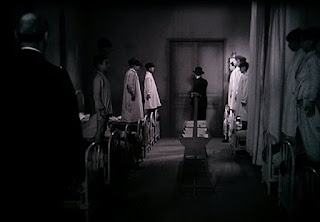

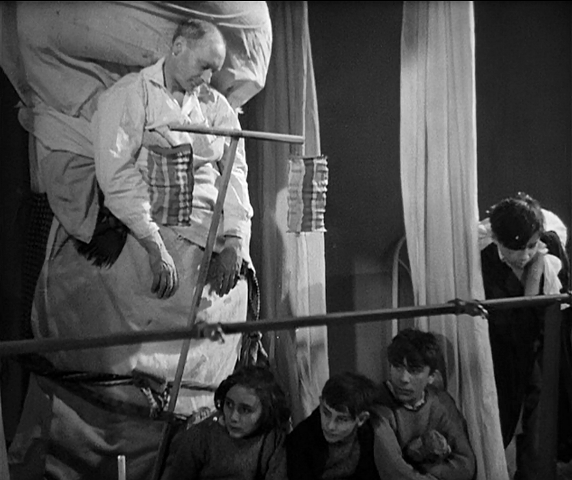

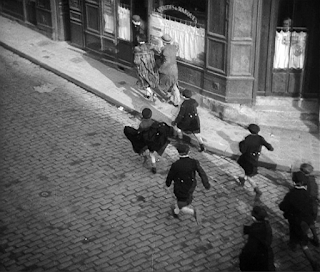
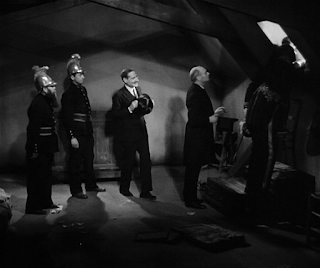




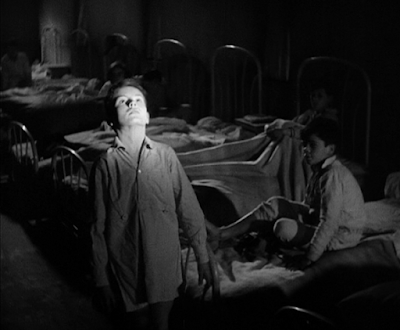

No comments:
Post a Comment